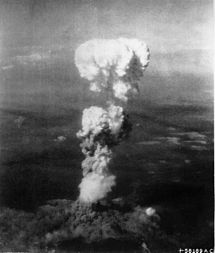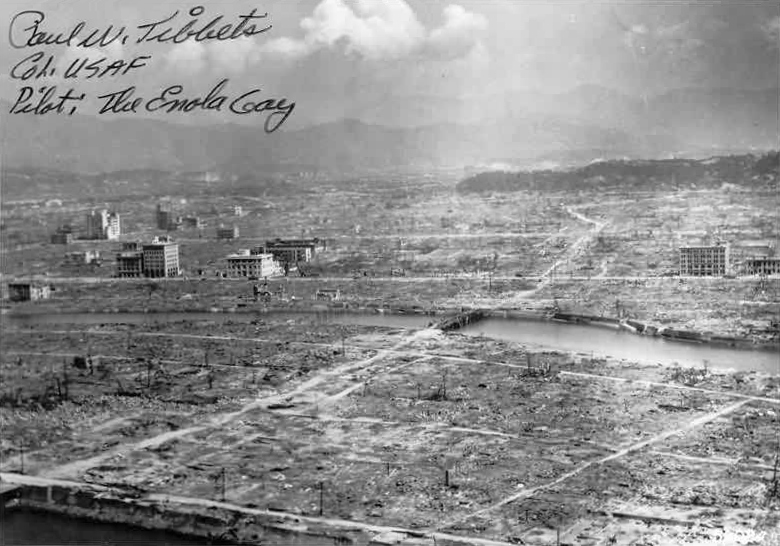A single death is a tragedy, a million deaths is a statistic.
–Josef Stalin
Today marks the 64th anniversary since the Hiroshima atomic bombing in 1945:

As many know, this was the first of two such atomic bombings, and WWII ended a few days later. This is of course history as we know it, but it’s easy to forget how many lives were affected by the blast.
When I lived in Seattle, I was a member of the Buddhist Churches of America, a Jodo Shinshu Buddhist group on the West Coast. Many of the members were Japanese-Americans across generations, and our congregation had ancestry mainly from the Hiroshima area, which is a stronghold of Shinshu followers historically. Many people at the temple were second, third or even fourth generation Americans, but the older generation still had ties to Japan through relatives and such.1 One night, at a late-night study group I met one elderly man who had seen the “black rain of Hiroshima” himself as a young boy in the countryside. The black rain of course was fallout and ashes from the blast, that reached the upper atmosphere and mixed with precipitation. I can’t imagine what it must be like to see the ashes from the blast, containing debris, people, everything that had been vaporized in the bombing into a fine powder:

Later, while studying Japanese this year, I had come across the story of Nagai Takashi who was a radiologist and Japanese-Christian that survived the Nagasaki bombing. He had found the remains of this wife at their home after searching for her, and later came down with radiation sickness, or genbakushō (原爆症) on top of the leukemia he already had before the war. He spent the remaining years of his life writing furiously in the hospital about the need for peace and a nuclear-free world.
Lastly, I was recently inspired by another story from the Asahi Shinbun about a US Marine, who had a change of heart regarding the atomic bombings and began campaigning for a nuclear-free world. This came after he had seen an exhibit of photos after the blast and the harm it had caused.
The point here isn’t to criticize the policies of the US, or to make Japan look like a victim. Japan has its own terrible war crimes in East Asia that it has not yet repented for.2 However, the point of this post is to remind readers that despite who was right or wrong, a lot of people died. Not just soldiers in combat, but also women, children and elderly, and it’s easy to forget this when we focus on abstract theories or statistics. We have to prove Stalin wrong, and that the deaths of many people is not just a statistic, it’s a tragedy that affects everyone.
I like to avoid political discussions on this blog or anything particularly contentious as I don’t like being confrontational, or controversial, but I will say that like President Obama, and the mayor of Hiroshima, I do hope for a nuclear-free world someday.
P.S. For the record, I actually do support nuclear technology for peaceful means, just not as a means of inflicting harm on others. I definitely do not like it when certain dictators hold a nuclear threat over people’s heads too. It’s inexcusable.
1 We still hold memorials on the following sunday each year, as some of the congregation mourn lost relatives to the blast. The bombing isn’t just history, people are really impacted by it.
2 More on that in a post on Yasukuni Shrine.

What allows people to kill is lack of empathy. You must first see the other person as non-human and so undeserving of life. Indeed it is what allows people to eat animals; they are seen as having a lesser right to exist or to exist only for our benefit.
And so humankind is capable of wiping out a city at the push of a button. Or killing on a huge scale up close and personal person by person in places like Rwanda or Cambodia. Unfortunately nuclear weapons only make it a little bit easier, nuclear free and we’ll just use napalm, napalm free and we’ll do it with pointy sticks if that’s all we have.
I don’t think limiting technology is truly the answer. The much harder task is for humankind to have universal empathy with an attendant lack of desire for revenge or covetous over resources or petty tribalism.
Maybe that has to start at home and with your neighbour….
from what I gather these are Buddhist virtues…
Great comments here, Robert. I agree that the nuclear-issue is really a minor one, but a symptom of a greater problem. Still, being conscious of the problems nuclear warfare has caused may help inspire others toward a more comprehensive approach to peace, like Nagai Takashi or the US Marine discovered.
You got it right though, we dehumanize the “other side” and create an “us vs. them” attitude which helps nobody. YOu’re right, it is a Buddhist virtue to see that all beings are interdependent. Not in the hokey “all is one” sense, but more of a simple acknowledgement that you are who you are because of other people. The classic Buddhist analogy of a candle in a hall of mirrors holds true here.
In the past, I used to say from time to time, “be a light for others” because if you do that in your own neighborhood, it eventually improves life for all. It doesn’t have to be some big effort far away, but little things done here and now make a difference. Rising tide lifts all boats and all that.
Although my visit to the memorial in Hiroshima was painful, it was meeting of family members of the fishermen in the village where I lived with my teacher that caused me shame. I was invited to a student’s family home for dinner and when I arrived the grandfather left the room in anger. I was told that he and his son were part of the fishing fleet who were fishing apparently near the Bikini Atoll where US nuclear testing was being performed and were exposed to radiation causing his sickness and his son’s death as well as most of a generation of fishermen in Yaizu shi, Japan. Thank you for your remembrance of the tragedies at Hiroshima and Nagasaki.
Robby
Soto Zen Priest living in Seattle
Hi Robby,
Welcome to the JLR! That’s a really powerful story, especially since the US’s testing and military use of the islands in the Pacific is still ongoing (Kwajalein among other places). This proves all the more so how regular people still get caught up in the meddling of bigger powers.
P.S. Didn’t even know there was a Soto Zen priest in Seattle. We should chat sometime. I’ve a few questions I’d like to ask if you are available.
Thanks!
I would be happy to talk with you by email or my phone is XXX-XXX-XXXX
Thanks I didn’t know there was still testing going on. I am motivated to look into this and write my legislators to express my disagreement with this use of my taxes for this dangerous activity.
Robby Ryuzen
Note: Blog admin edited out phone number.
Robby: Thanks, I’ll send you an email sometime. Edited out your phone number by the way for safety reasons.